Organisational Behaviour Report: Tesco and Employee Behaviour
VerifiedAdded on 2021/02/19
|18
|5622
|25
Report
AI Summary
This report provides an in-depth analysis of organisational behaviour within Tesco, a public limited company in the UK. It explores the influence of cultural, political, and power factors on employee behaviour, examining topics such as organisational culture (power, role, task, and person cultures), Hofstede's cultural dimensions, and the impact of different power sources (reward, coercive, legitimate, expert, and referent). The report further evaluates motivational theories, including Maslow's hierarchy of needs, and their application in achieving organisational objectives. It also discusses various types of organisational teams, team dynamics, and the resolution of conflicts. The report concludes with an overview of organisational change and its impact on employee relationships and productivity.
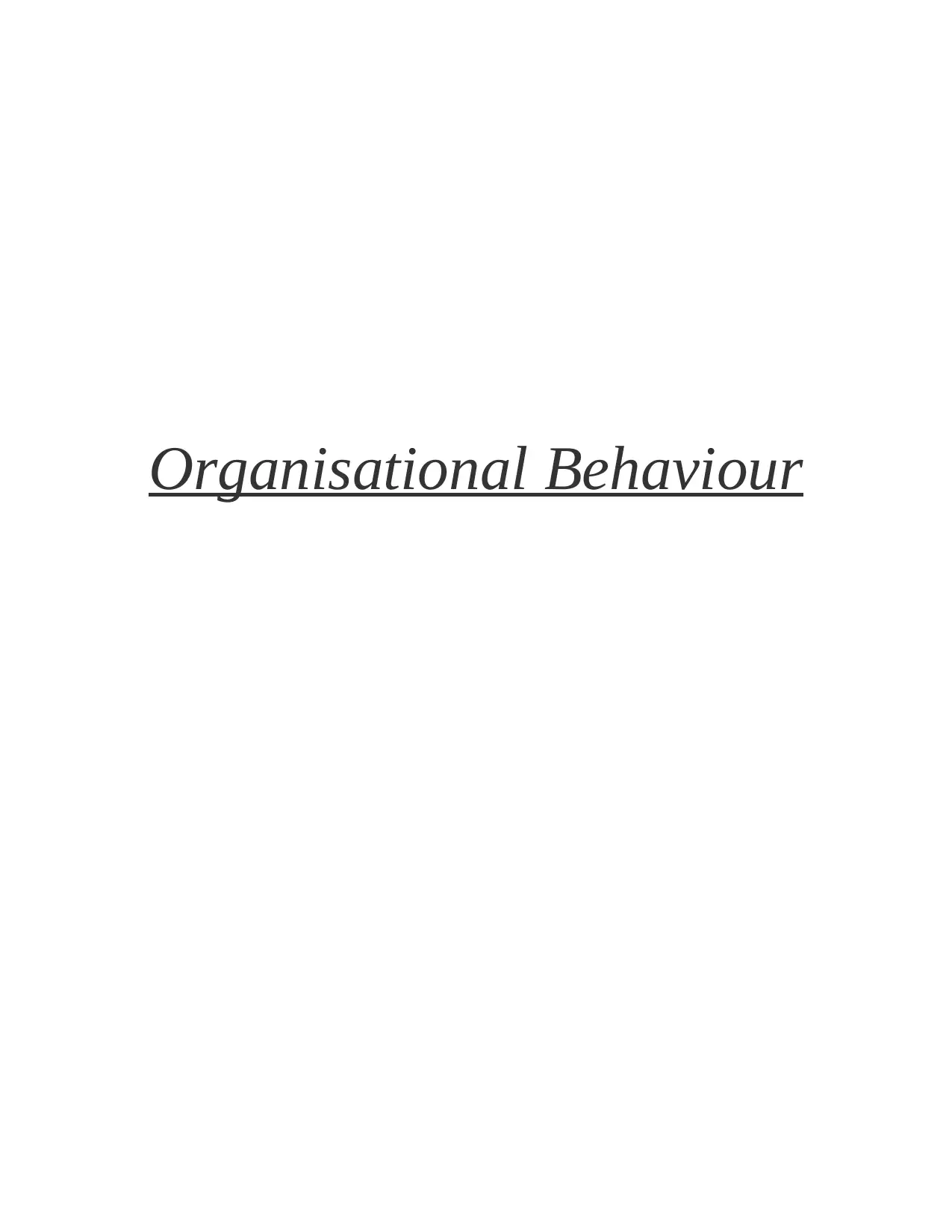
Organisational Behaviour
Paraphrase This Document
Need a fresh take? Get an instant paraphrase of this document with our AI Paraphraser
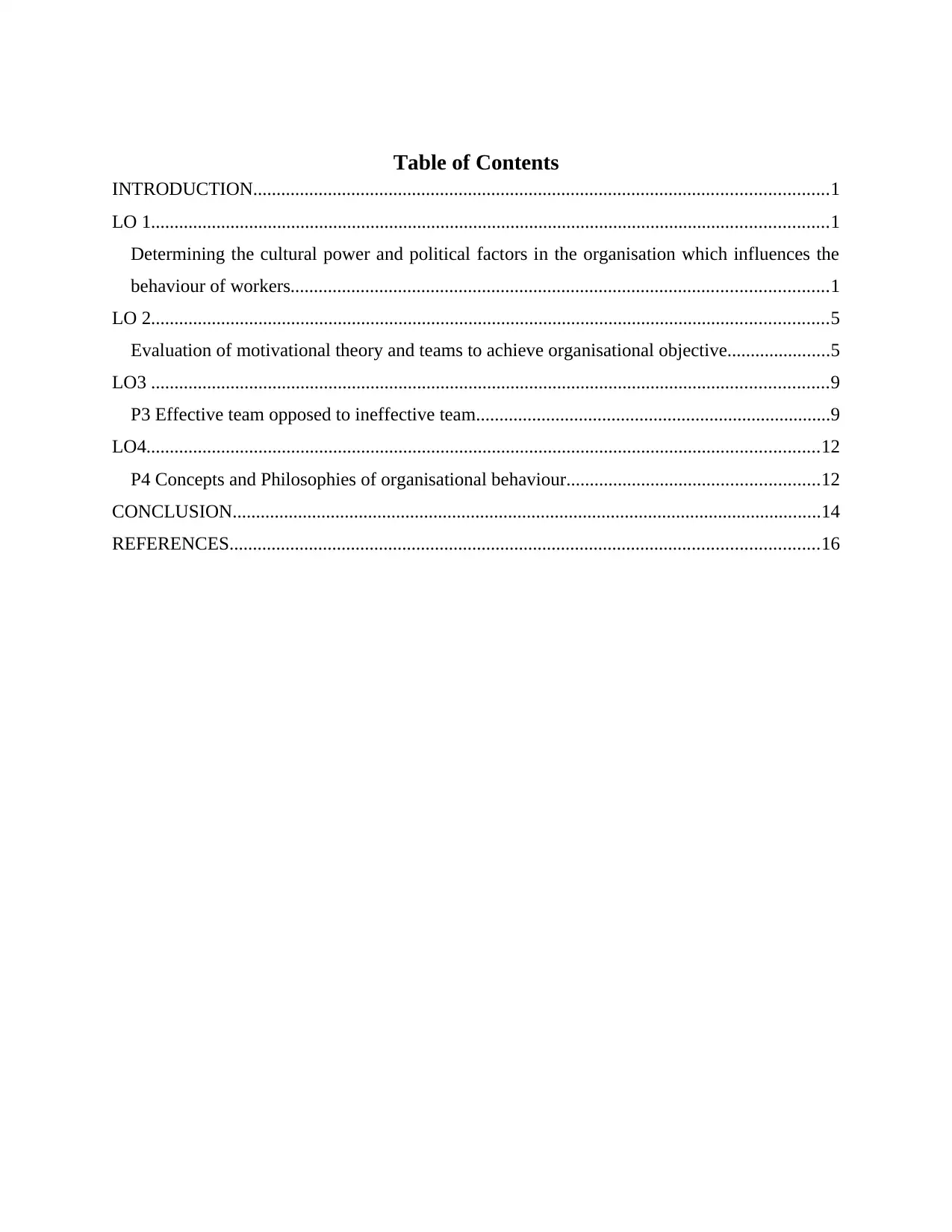
Table of Contents
INTRODUCTION...........................................................................................................................1
LO 1.................................................................................................................................................1
Determining the cultural power and political factors in the organisation which influences the
behaviour of workers...................................................................................................................1
LO 2.................................................................................................................................................5
Evaluation of motivational theory and teams to achieve organisational objective......................5
LO3 .................................................................................................................................................9
P3 Effective team opposed to ineffective team............................................................................9
LO4................................................................................................................................................12
P4 Concepts and Philosophies of organisational behaviour......................................................12
CONCLUSION..............................................................................................................................14
REFERENCES..............................................................................................................................16
INTRODUCTION...........................................................................................................................1
LO 1.................................................................................................................................................1
Determining the cultural power and political factors in the organisation which influences the
behaviour of workers...................................................................................................................1
LO 2.................................................................................................................................................5
Evaluation of motivational theory and teams to achieve organisational objective......................5
LO3 .................................................................................................................................................9
P3 Effective team opposed to ineffective team............................................................................9
LO4................................................................................................................................................12
P4 Concepts and Philosophies of organisational behaviour......................................................12
CONCLUSION..............................................................................................................................14
REFERENCES..............................................................................................................................16
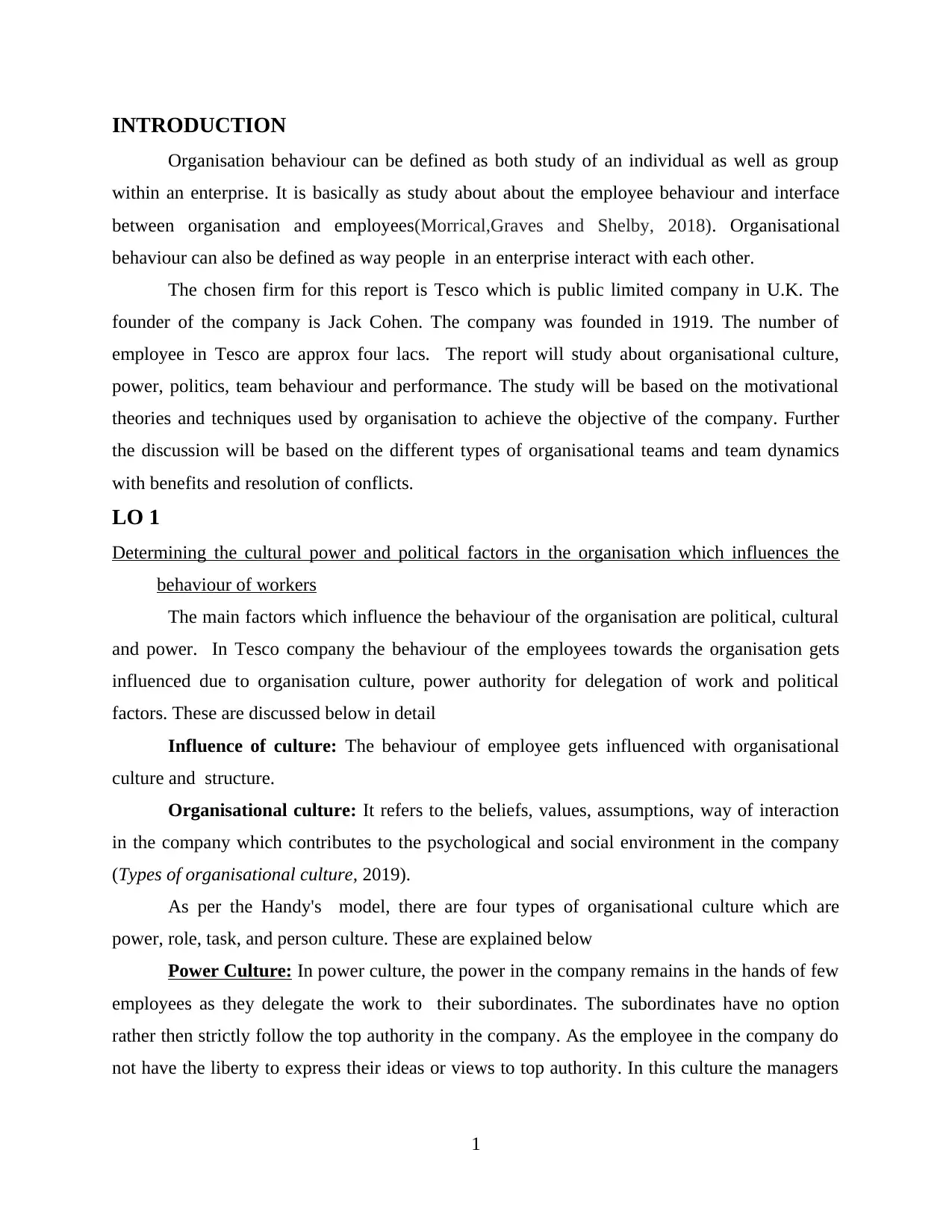
INTRODUCTION
Organisation behaviour can be defined as both study of an individual as well as group
within an enterprise. It is basically as study about about the employee behaviour and interface
between organisation and employees(Morrical,Graves and Shelby, 2018). Organisational
behaviour can also be defined as way people in an enterprise interact with each other.
The chosen firm for this report is Tesco which is public limited company in U.K. The
founder of the company is Jack Cohen. The company was founded in 1919. The number of
employee in Tesco are approx four lacs. The report will study about organisational culture,
power, politics, team behaviour and performance. The study will be based on the motivational
theories and techniques used by organisation to achieve the objective of the company. Further
the discussion will be based on the different types of organisational teams and team dynamics
with benefits and resolution of conflicts.
LO 1
Determining the cultural power and political factors in the organisation which influences the
behaviour of workers
The main factors which influence the behaviour of the organisation are political, cultural
and power. In Tesco company the behaviour of the employees towards the organisation gets
influenced due to organisation culture, power authority for delegation of work and political
factors. These are discussed below in detail
Influence of culture: The behaviour of employee gets influenced with organisational
culture and structure.
Organisational culture: It refers to the beliefs, values, assumptions, way of interaction
in the company which contributes to the psychological and social environment in the company
(Types of organisational culture, 2019).
As per the Handy's model, there are four types of organisational culture which are
power, role, task, and person culture. These are explained below
Power Culture: In power culture, the power in the company remains in the hands of few
employees as they delegate the work to their subordinates. The subordinates have no option
rather then strictly follow the top authority in the company. As the employee in the company do
not have the liberty to express their ideas or views to top authority. In this culture the managers
1
Organisation behaviour can be defined as both study of an individual as well as group
within an enterprise. It is basically as study about about the employee behaviour and interface
between organisation and employees(Morrical,Graves and Shelby, 2018). Organisational
behaviour can also be defined as way people in an enterprise interact with each other.
The chosen firm for this report is Tesco which is public limited company in U.K. The
founder of the company is Jack Cohen. The company was founded in 1919. The number of
employee in Tesco are approx four lacs. The report will study about organisational culture,
power, politics, team behaviour and performance. The study will be based on the motivational
theories and techniques used by organisation to achieve the objective of the company. Further
the discussion will be based on the different types of organisational teams and team dynamics
with benefits and resolution of conflicts.
LO 1
Determining the cultural power and political factors in the organisation which influences the
behaviour of workers
The main factors which influence the behaviour of the organisation are political, cultural
and power. In Tesco company the behaviour of the employees towards the organisation gets
influenced due to organisation culture, power authority for delegation of work and political
factors. These are discussed below in detail
Influence of culture: The behaviour of employee gets influenced with organisational
culture and structure.
Organisational culture: It refers to the beliefs, values, assumptions, way of interaction
in the company which contributes to the psychological and social environment in the company
(Types of organisational culture, 2019).
As per the Handy's model, there are four types of organisational culture which are
power, role, task, and person culture. These are explained below
Power Culture: In power culture, the power in the company remains in the hands of few
employees as they delegate the work to their subordinates. The subordinates have no option
rather then strictly follow the top authority in the company. As the employee in the company do
not have the liberty to express their ideas or views to top authority. In this culture the managers
1
⊘ This is a preview!⊘
Do you want full access?
Subscribe today to unlock all pages.

Trusted by 1+ million students worldwide
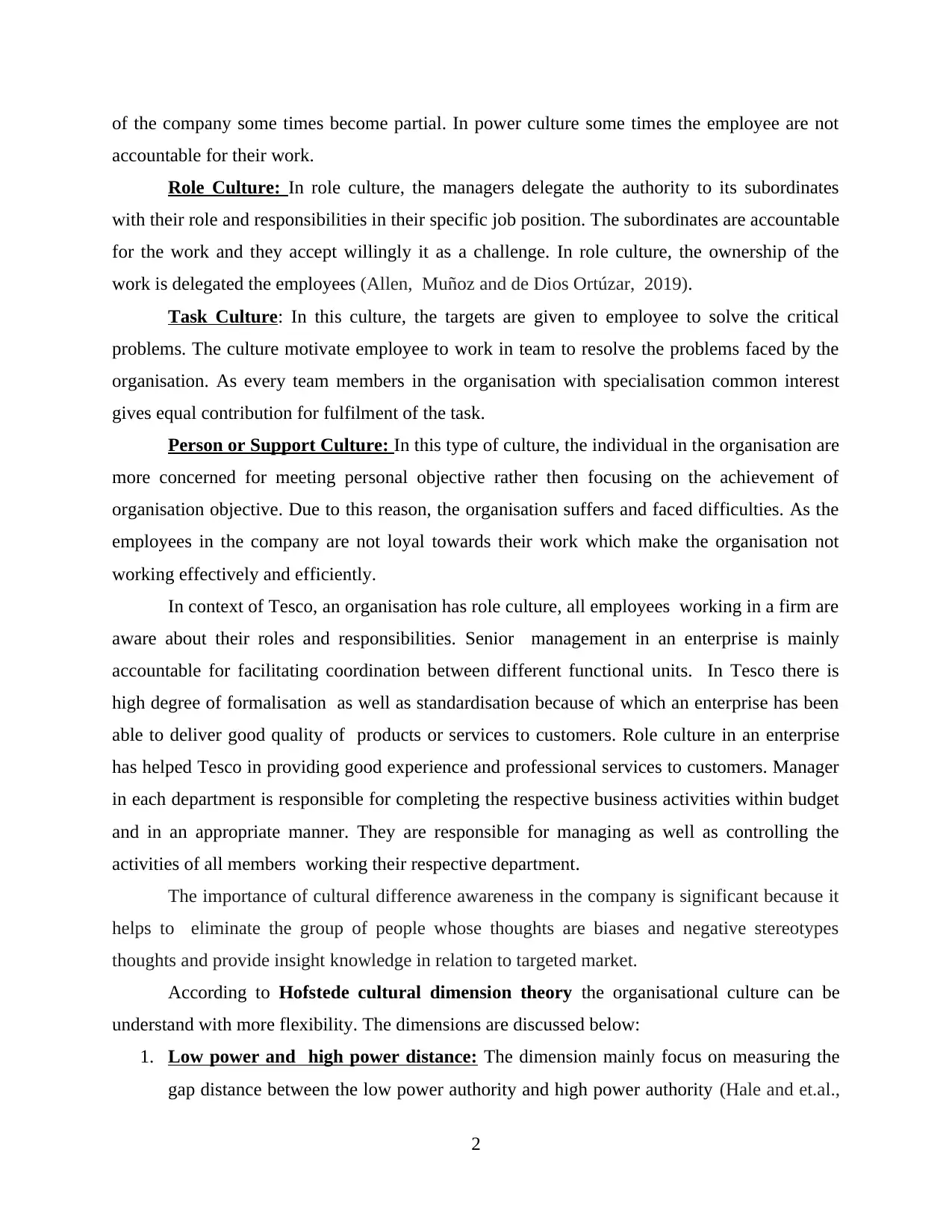
of the company some times become partial. In power culture some times the employee are not
accountable for their work.
Role Culture: In role culture, the managers delegate the authority to its subordinates
with their role and responsibilities in their specific job position. The subordinates are accountable
for the work and they accept willingly it as a challenge. In role culture, the ownership of the
work is delegated the employees (Allen, Muñoz and de Dios Ortúzar, 2019).
Task Culture: In this culture, the targets are given to employee to solve the critical
problems. The culture motivate employee to work in team to resolve the problems faced by the
organisation. As every team members in the organisation with specialisation common interest
gives equal contribution for fulfilment of the task.
Person or Support Culture: In this type of culture, the individual in the organisation are
more concerned for meeting personal objective rather then focusing on the achievement of
organisation objective. Due to this reason, the organisation suffers and faced difficulties. As the
employees in the company are not loyal towards their work which make the organisation not
working effectively and efficiently.
In context of Tesco, an organisation has role culture, all employees working in a firm are
aware about their roles and responsibilities. Senior management in an enterprise is mainly
accountable for facilitating coordination between different functional units. In Tesco there is
high degree of formalisation as well as standardisation because of which an enterprise has been
able to deliver good quality of products or services to customers. Role culture in an enterprise
has helped Tesco in providing good experience and professional services to customers. Manager
in each department is responsible for completing the respective business activities within budget
and in an appropriate manner. They are responsible for managing as well as controlling the
activities of all members working their respective department.
The importance of cultural difference awareness in the company is significant because it
helps to eliminate the group of people whose thoughts are biases and negative stereotypes
thoughts and provide insight knowledge in relation to targeted market.
According to Hofstede cultural dimension theory the organisational culture can be
understand with more flexibility. The dimensions are discussed below:
1. Low power and high power distance: The dimension mainly focus on measuring the
gap distance between the low power authority and high power authority (Hale and et.al.,
2
accountable for their work.
Role Culture: In role culture, the managers delegate the authority to its subordinates
with their role and responsibilities in their specific job position. The subordinates are accountable
for the work and they accept willingly it as a challenge. In role culture, the ownership of the
work is delegated the employees (Allen, Muñoz and de Dios Ortúzar, 2019).
Task Culture: In this culture, the targets are given to employee to solve the critical
problems. The culture motivate employee to work in team to resolve the problems faced by the
organisation. As every team members in the organisation with specialisation common interest
gives equal contribution for fulfilment of the task.
Person or Support Culture: In this type of culture, the individual in the organisation are
more concerned for meeting personal objective rather then focusing on the achievement of
organisation objective. Due to this reason, the organisation suffers and faced difficulties. As the
employees in the company are not loyal towards their work which make the organisation not
working effectively and efficiently.
In context of Tesco, an organisation has role culture, all employees working in a firm are
aware about their roles and responsibilities. Senior management in an enterprise is mainly
accountable for facilitating coordination between different functional units. In Tesco there is
high degree of formalisation as well as standardisation because of which an enterprise has been
able to deliver good quality of products or services to customers. Role culture in an enterprise
has helped Tesco in providing good experience and professional services to customers. Manager
in each department is responsible for completing the respective business activities within budget
and in an appropriate manner. They are responsible for managing as well as controlling the
activities of all members working their respective department.
The importance of cultural difference awareness in the company is significant because it
helps to eliminate the group of people whose thoughts are biases and negative stereotypes
thoughts and provide insight knowledge in relation to targeted market.
According to Hofstede cultural dimension theory the organisational culture can be
understand with more flexibility. The dimensions are discussed below:
1. Low power and high power distance: The dimension mainly focus on measuring the
gap distance between the low power authority and high power authority (Hale and et.al.,
2
Paraphrase This Document
Need a fresh take? Get an instant paraphrase of this document with our AI Paraphraser
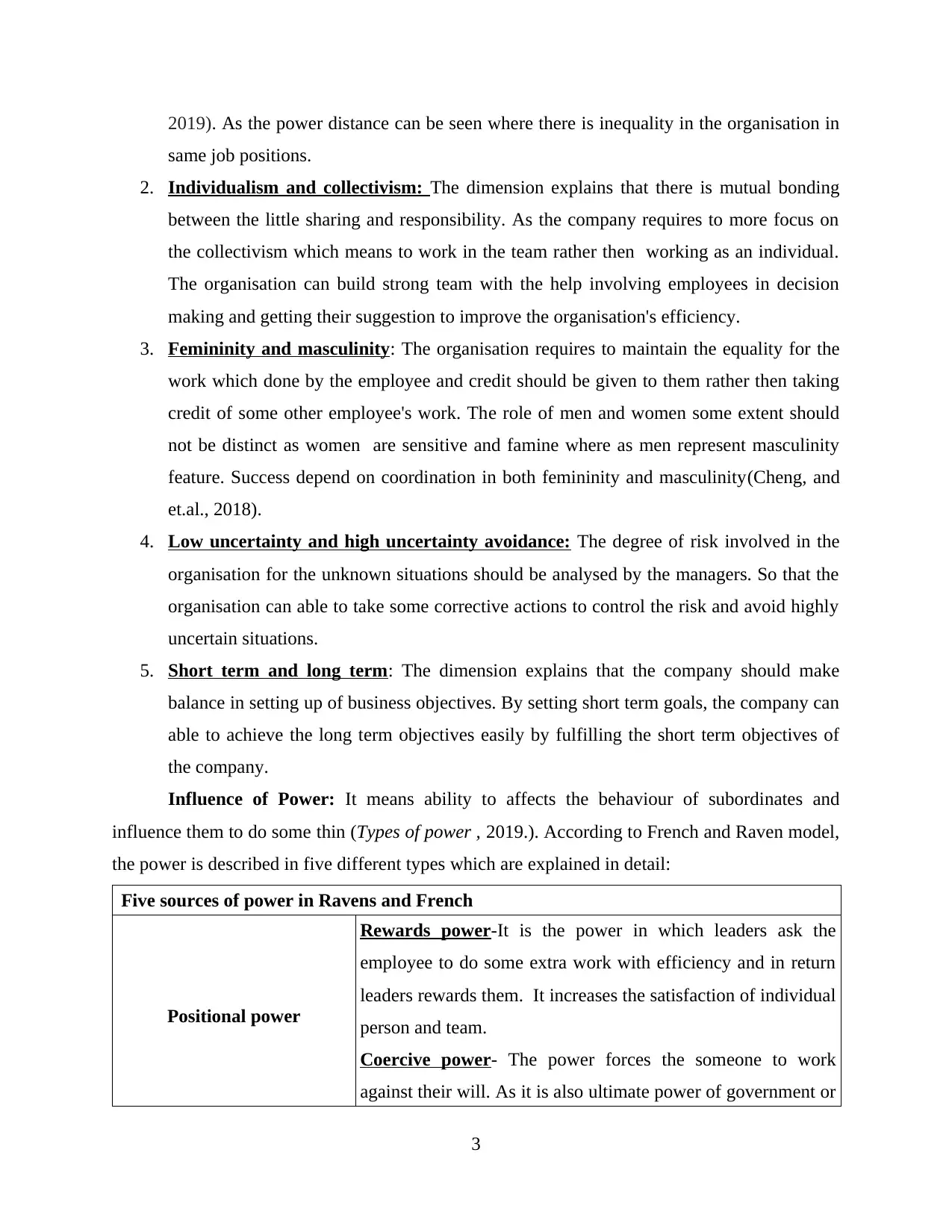
2019). As the power distance can be seen where there is inequality in the organisation in
same job positions.
2. Individualism and collectivism: The dimension explains that there is mutual bonding
between the little sharing and responsibility. As the company requires to more focus on
the collectivism which means to work in the team rather then working as an individual.
The organisation can build strong team with the help involving employees in decision
making and getting their suggestion to improve the organisation's efficiency.
3. Femininity and masculinity: The organisation requires to maintain the equality for the
work which done by the employee and credit should be given to them rather then taking
credit of some other employee's work. The role of men and women some extent should
not be distinct as women are sensitive and famine where as men represent masculinity
feature. Success depend on coordination in both femininity and masculinity(Cheng, and
et.al., 2018).
4. Low uncertainty and high uncertainty avoidance: The degree of risk involved in the
organisation for the unknown situations should be analysed by the managers. So that the
organisation can able to take some corrective actions to control the risk and avoid highly
uncertain situations.
5. Short term and long term: The dimension explains that the company should make
balance in setting up of business objectives. By setting short term goals, the company can
able to achieve the long term objectives easily by fulfilling the short term objectives of
the company.
Influence of Power: It means ability to affects the behaviour of subordinates and
influence them to do some thin (Types of power , 2019.). According to French and Raven model,
the power is described in five different types which are explained in detail:
Five sources of power in Ravens and French
Positional power
Rewards power-It is the power in which leaders ask the
employee to do some extra work with efficiency and in return
leaders rewards them. It increases the satisfaction of individual
person and team.
Coercive power- The power forces the someone to work
against their will. As it is also ultimate power of government or
3
same job positions.
2. Individualism and collectivism: The dimension explains that there is mutual bonding
between the little sharing and responsibility. As the company requires to more focus on
the collectivism which means to work in the team rather then working as an individual.
The organisation can build strong team with the help involving employees in decision
making and getting their suggestion to improve the organisation's efficiency.
3. Femininity and masculinity: The organisation requires to maintain the equality for the
work which done by the employee and credit should be given to them rather then taking
credit of some other employee's work. The role of men and women some extent should
not be distinct as women are sensitive and famine where as men represent masculinity
feature. Success depend on coordination in both femininity and masculinity(Cheng, and
et.al., 2018).
4. Low uncertainty and high uncertainty avoidance: The degree of risk involved in the
organisation for the unknown situations should be analysed by the managers. So that the
organisation can able to take some corrective actions to control the risk and avoid highly
uncertain situations.
5. Short term and long term: The dimension explains that the company should make
balance in setting up of business objectives. By setting short term goals, the company can
able to achieve the long term objectives easily by fulfilling the short term objectives of
the company.
Influence of Power: It means ability to affects the behaviour of subordinates and
influence them to do some thin (Types of power , 2019.). According to French and Raven model,
the power is described in five different types which are explained in detail:
Five sources of power in Ravens and French
Positional power
Rewards power-It is the power in which leaders ask the
employee to do some extra work with efficiency and in return
leaders rewards them. It increases the satisfaction of individual
person and team.
Coercive power- The power forces the someone to work
against their will. As it is also ultimate power of government or
3
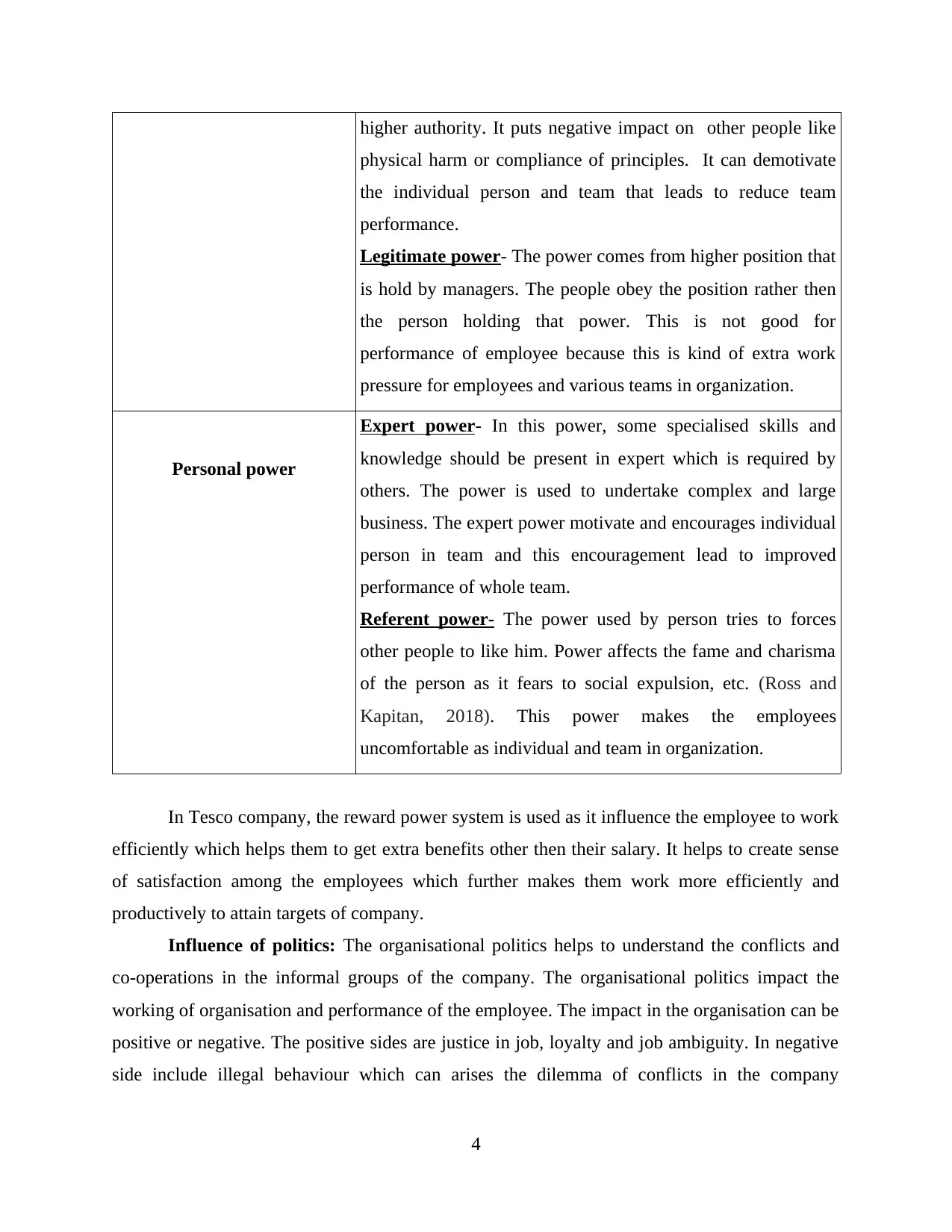
higher authority. It puts negative impact on other people like
physical harm or compliance of principles. It can demotivate
the individual person and team that leads to reduce team
performance.
Legitimate power- The power comes from higher position that
is hold by managers. The people obey the position rather then
the person holding that power. This is not good for
performance of employee because this is kind of extra work
pressure for employees and various teams in organization.
Personal power
Expert power- In this power, some specialised skills and
knowledge should be present in expert which is required by
others. The power is used to undertake complex and large
business. The expert power motivate and encourages individual
person in team and this encouragement lead to improved
performance of whole team.
Referent power- The power used by person tries to forces
other people to like him. Power affects the fame and charisma
of the person as it fears to social expulsion, etc. (Ross and
Kapitan, 2018). This power makes the employees
uncomfortable as individual and team in organization.
In Tesco company, the reward power system is used as it influence the employee to work
efficiently which helps them to get extra benefits other then their salary. It helps to create sense
of satisfaction among the employees which further makes them work more efficiently and
productively to attain targets of company.
Influence of politics: The organisational politics helps to understand the conflicts and
co-operations in the informal groups of the company. The organisational politics impact the
working of organisation and performance of the employee. The impact in the organisation can be
positive or negative. The positive sides are justice in job, loyalty and job ambiguity. In negative
side include illegal behaviour which can arises the dilemma of conflicts in the company
4
physical harm or compliance of principles. It can demotivate
the individual person and team that leads to reduce team
performance.
Legitimate power- The power comes from higher position that
is hold by managers. The people obey the position rather then
the person holding that power. This is not good for
performance of employee because this is kind of extra work
pressure for employees and various teams in organization.
Personal power
Expert power- In this power, some specialised skills and
knowledge should be present in expert which is required by
others. The power is used to undertake complex and large
business. The expert power motivate and encourages individual
person in team and this encouragement lead to improved
performance of whole team.
Referent power- The power used by person tries to forces
other people to like him. Power affects the fame and charisma
of the person as it fears to social expulsion, etc. (Ross and
Kapitan, 2018). This power makes the employees
uncomfortable as individual and team in organization.
In Tesco company, the reward power system is used as it influence the employee to work
efficiently which helps them to get extra benefits other then their salary. It helps to create sense
of satisfaction among the employees which further makes them work more efficiently and
productively to attain targets of company.
Influence of politics: The organisational politics helps to understand the conflicts and
co-operations in the informal groups of the company. The organisational politics impact the
working of organisation and performance of the employee. The impact in the organisation can be
positive or negative. The positive sides are justice in job, loyalty and job ambiguity. In negative
side include illegal behaviour which can arises the dilemma of conflicts in the company
4
⊘ This is a preview!⊘
Do you want full access?
Subscribe today to unlock all pages.

Trusted by 1+ million students worldwide
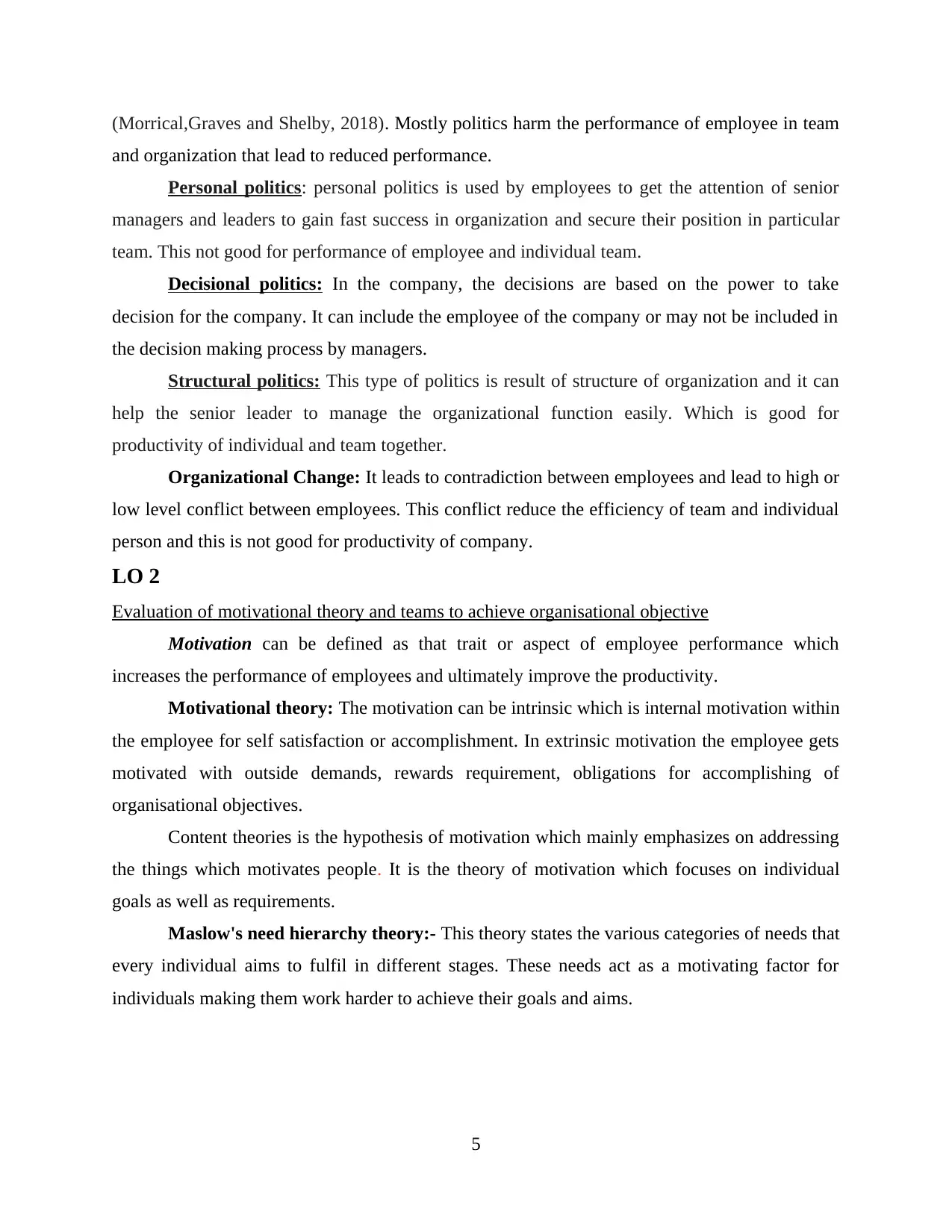
(Morrical,Graves and Shelby, 2018). Mostly politics harm the performance of employee in team
and organization that lead to reduced performance.
Personal politics: personal politics is used by employees to get the attention of senior
managers and leaders to gain fast success in organization and secure their position in particular
team. This not good for performance of employee and individual team.
Decisional politics: In the company, the decisions are based on the power to take
decision for the company. It can include the employee of the company or may not be included in
the decision making process by managers.
Structural politics: This type of politics is result of structure of organization and it can
help the senior leader to manage the organizational function easily. Which is good for
productivity of individual and team together.
Organizational Change: It leads to contradiction between employees and lead to high or
low level conflict between employees. This conflict reduce the efficiency of team and individual
person and this is not good for productivity of company.
LO 2
Evaluation of motivational theory and teams to achieve organisational objective
Motivation can be defined as that trait or aspect of employee performance which
increases the performance of employees and ultimately improve the productivity.
Motivational theory: The motivation can be intrinsic which is internal motivation within
the employee for self satisfaction or accomplishment. In extrinsic motivation the employee gets
motivated with outside demands, rewards requirement, obligations for accomplishing of
organisational objectives.
Content theories is the hypothesis of motivation which mainly emphasizes on addressing
the things which motivates people. It is the theory of motivation which focuses on individual
goals as well as requirements.
Maslow's need hierarchy theory:- This theory states the various categories of needs that
every individual aims to fulfil in different stages. These needs act as a motivating factor for
individuals making them work harder to achieve their goals and aims.
5
and organization that lead to reduced performance.
Personal politics: personal politics is used by employees to get the attention of senior
managers and leaders to gain fast success in organization and secure their position in particular
team. This not good for performance of employee and individual team.
Decisional politics: In the company, the decisions are based on the power to take
decision for the company. It can include the employee of the company or may not be included in
the decision making process by managers.
Structural politics: This type of politics is result of structure of organization and it can
help the senior leader to manage the organizational function easily. Which is good for
productivity of individual and team together.
Organizational Change: It leads to contradiction between employees and lead to high or
low level conflict between employees. This conflict reduce the efficiency of team and individual
person and this is not good for productivity of company.
LO 2
Evaluation of motivational theory and teams to achieve organisational objective
Motivation can be defined as that trait or aspect of employee performance which
increases the performance of employees and ultimately improve the productivity.
Motivational theory: The motivation can be intrinsic which is internal motivation within
the employee for self satisfaction or accomplishment. In extrinsic motivation the employee gets
motivated with outside demands, rewards requirement, obligations for accomplishing of
organisational objectives.
Content theories is the hypothesis of motivation which mainly emphasizes on addressing
the things which motivates people. It is the theory of motivation which focuses on individual
goals as well as requirements.
Maslow's need hierarchy theory:- This theory states the various categories of needs that
every individual aims to fulfil in different stages. These needs act as a motivating factor for
individuals making them work harder to achieve their goals and aims.
5
Paraphrase This Document
Need a fresh take? Get an instant paraphrase of this document with our AI Paraphraser
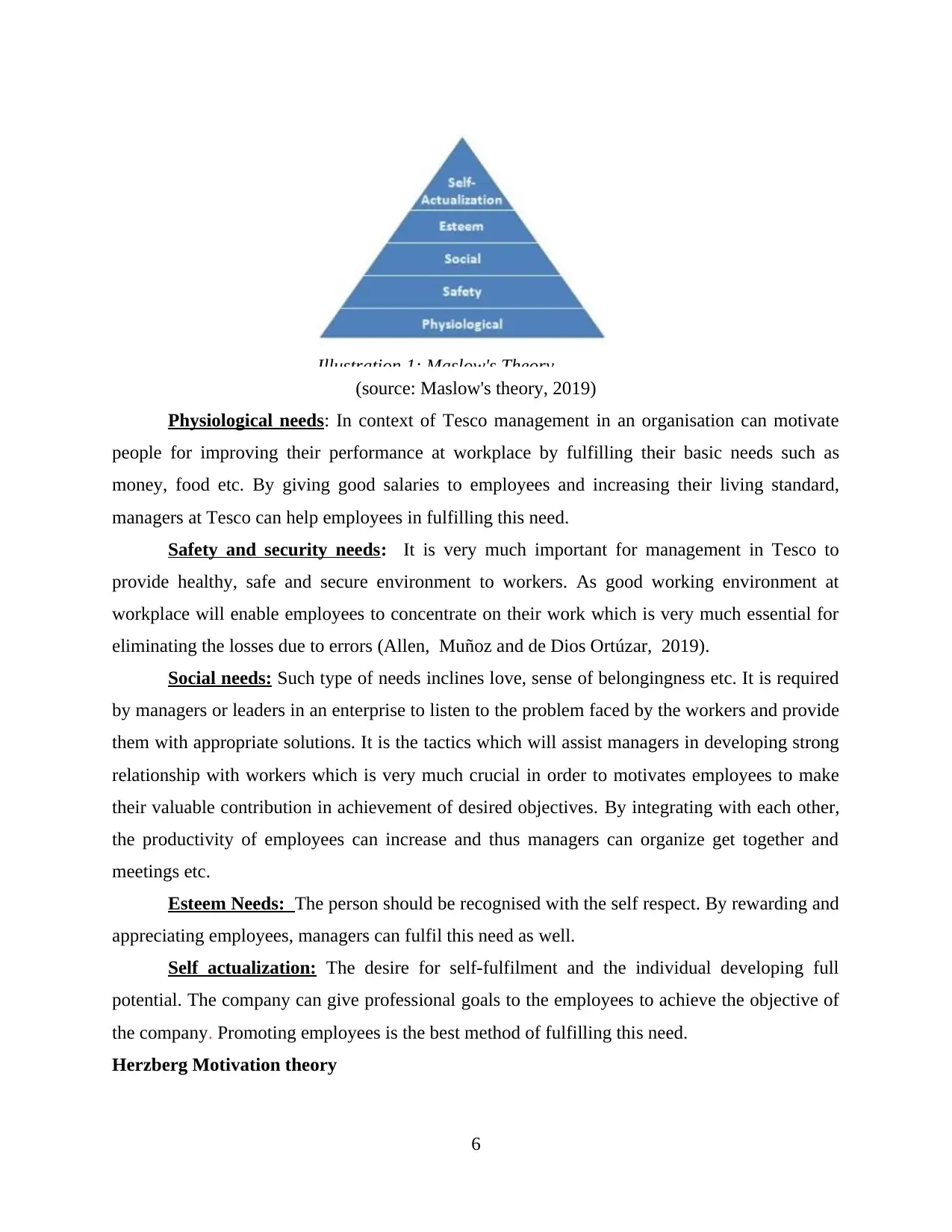
(source: Maslow's theory, 2019)
Physiological needs: In context of Tesco management in an organisation can motivate
people for improving their performance at workplace by fulfilling their basic needs such as
money, food etc. By giving good salaries to employees and increasing their living standard,
managers at Tesco can help employees in fulfilling this need.
Safety and security needs: It is very much important for management in Tesco to
provide healthy, safe and secure environment to workers. As good working environment at
workplace will enable employees to concentrate on their work which is very much essential for
eliminating the losses due to errors (Allen, Muñoz and de Dios Ortúzar, 2019).
Social needs: Such type of needs inclines love, sense of belongingness etc. It is required
by managers or leaders in an enterprise to listen to the problem faced by the workers and provide
them with appropriate solutions. It is the tactics which will assist managers in developing strong
relationship with workers which is very much crucial in order to motivates employees to make
their valuable contribution in achievement of desired objectives. By integrating with each other,
the productivity of employees can increase and thus managers can organize get together and
meetings etc.
Esteem Needs: The person should be recognised with the self respect. By rewarding and
appreciating employees, managers can fulfil this need as well.
Self actualization: The desire for self-fulfilment and the individual developing full
potential. The company can give professional goals to the employees to achieve the objective of
the company. Promoting employees is the best method of fulfilling this need.
Herzberg Motivation theory
6
Illustration 1: Maslow's Theory
Physiological needs: In context of Tesco management in an organisation can motivate
people for improving their performance at workplace by fulfilling their basic needs such as
money, food etc. By giving good salaries to employees and increasing their living standard,
managers at Tesco can help employees in fulfilling this need.
Safety and security needs: It is very much important for management in Tesco to
provide healthy, safe and secure environment to workers. As good working environment at
workplace will enable employees to concentrate on their work which is very much essential for
eliminating the losses due to errors (Allen, Muñoz and de Dios Ortúzar, 2019).
Social needs: Such type of needs inclines love, sense of belongingness etc. It is required
by managers or leaders in an enterprise to listen to the problem faced by the workers and provide
them with appropriate solutions. It is the tactics which will assist managers in developing strong
relationship with workers which is very much crucial in order to motivates employees to make
their valuable contribution in achievement of desired objectives. By integrating with each other,
the productivity of employees can increase and thus managers can organize get together and
meetings etc.
Esteem Needs: The person should be recognised with the self respect. By rewarding and
appreciating employees, managers can fulfil this need as well.
Self actualization: The desire for self-fulfilment and the individual developing full
potential. The company can give professional goals to the employees to achieve the objective of
the company. Promoting employees is the best method of fulfilling this need.
Herzberg Motivation theory
6
Illustration 1: Maslow's Theory
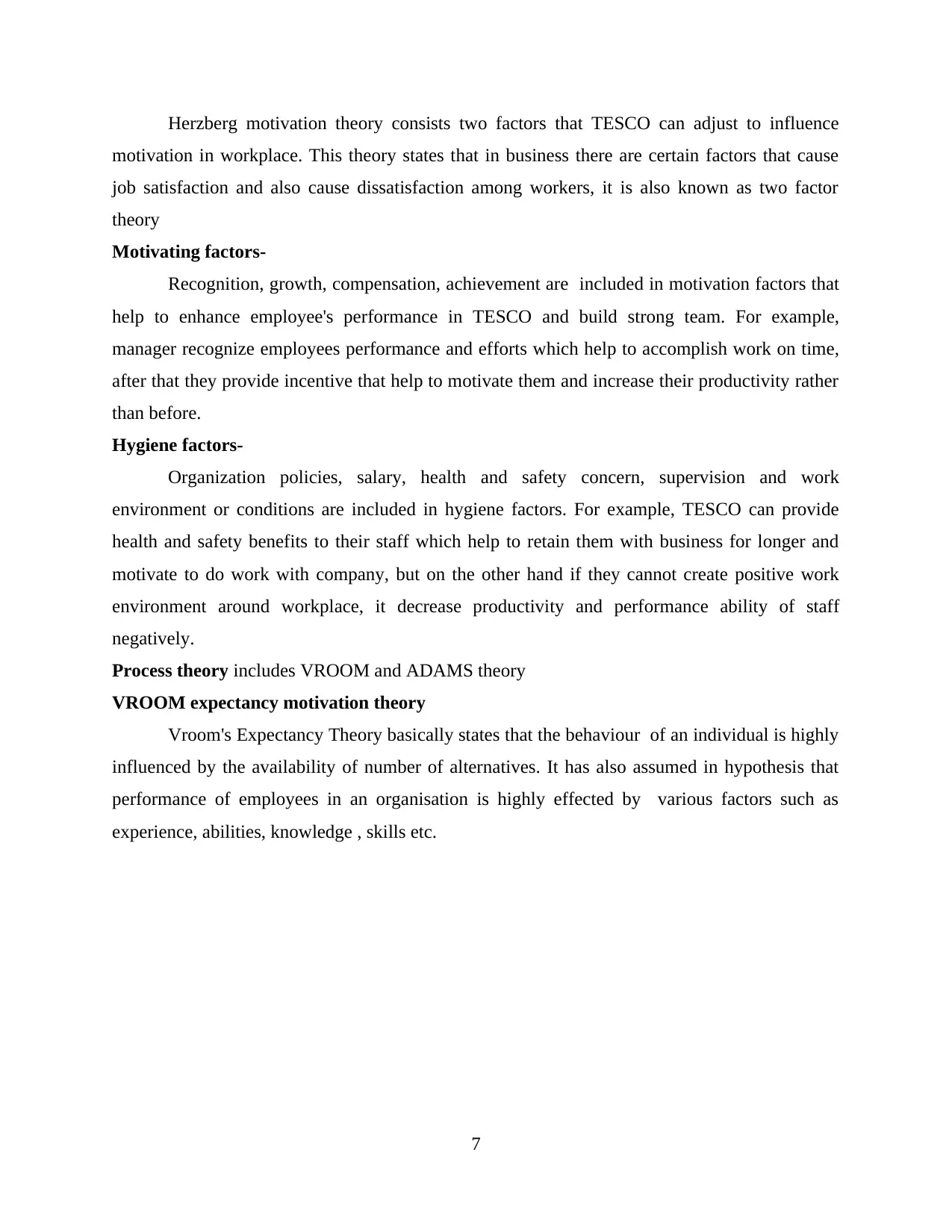
Herzberg motivation theory consists two factors that TESCO can adjust to influence
motivation in workplace. This theory states that in business there are certain factors that cause
job satisfaction and also cause dissatisfaction among workers, it is also known as two factor
theory
Motivating factors-
Recognition, growth, compensation, achievement are included in motivation factors that
help to enhance employee's performance in TESCO and build strong team. For example,
manager recognize employees performance and efforts which help to accomplish work on time,
after that they provide incentive that help to motivate them and increase their productivity rather
than before.
Hygiene factors-
Organization policies, salary, health and safety concern, supervision and work
environment or conditions are included in hygiene factors. For example, TESCO can provide
health and safety benefits to their staff which help to retain them with business for longer and
motivate to do work with company, but on the other hand if they cannot create positive work
environment around workplace, it decrease productivity and performance ability of staff
negatively.
Process theory includes VROOM and ADAMS theory
VROOM expectancy motivation theory
Vroom's Expectancy Theory basically states that the behaviour of an individual is highly
influenced by the availability of number of alternatives. It has also assumed in hypothesis that
performance of employees in an organisation is highly effected by various factors such as
experience, abilities, knowledge , skills etc.
7
motivation in workplace. This theory states that in business there are certain factors that cause
job satisfaction and also cause dissatisfaction among workers, it is also known as two factor
theory
Motivating factors-
Recognition, growth, compensation, achievement are included in motivation factors that
help to enhance employee's performance in TESCO and build strong team. For example,
manager recognize employees performance and efforts which help to accomplish work on time,
after that they provide incentive that help to motivate them and increase their productivity rather
than before.
Hygiene factors-
Organization policies, salary, health and safety concern, supervision and work
environment or conditions are included in hygiene factors. For example, TESCO can provide
health and safety benefits to their staff which help to retain them with business for longer and
motivate to do work with company, but on the other hand if they cannot create positive work
environment around workplace, it decrease productivity and performance ability of staff
negatively.
Process theory includes VROOM and ADAMS theory
VROOM expectancy motivation theory
Vroom's Expectancy Theory basically states that the behaviour of an individual is highly
influenced by the availability of number of alternatives. It has also assumed in hypothesis that
performance of employees in an organisation is highly effected by various factors such as
experience, abilities, knowledge , skills etc.
7
⊘ This is a preview!⊘
Do you want full access?
Subscribe today to unlock all pages.

Trusted by 1+ million students worldwide
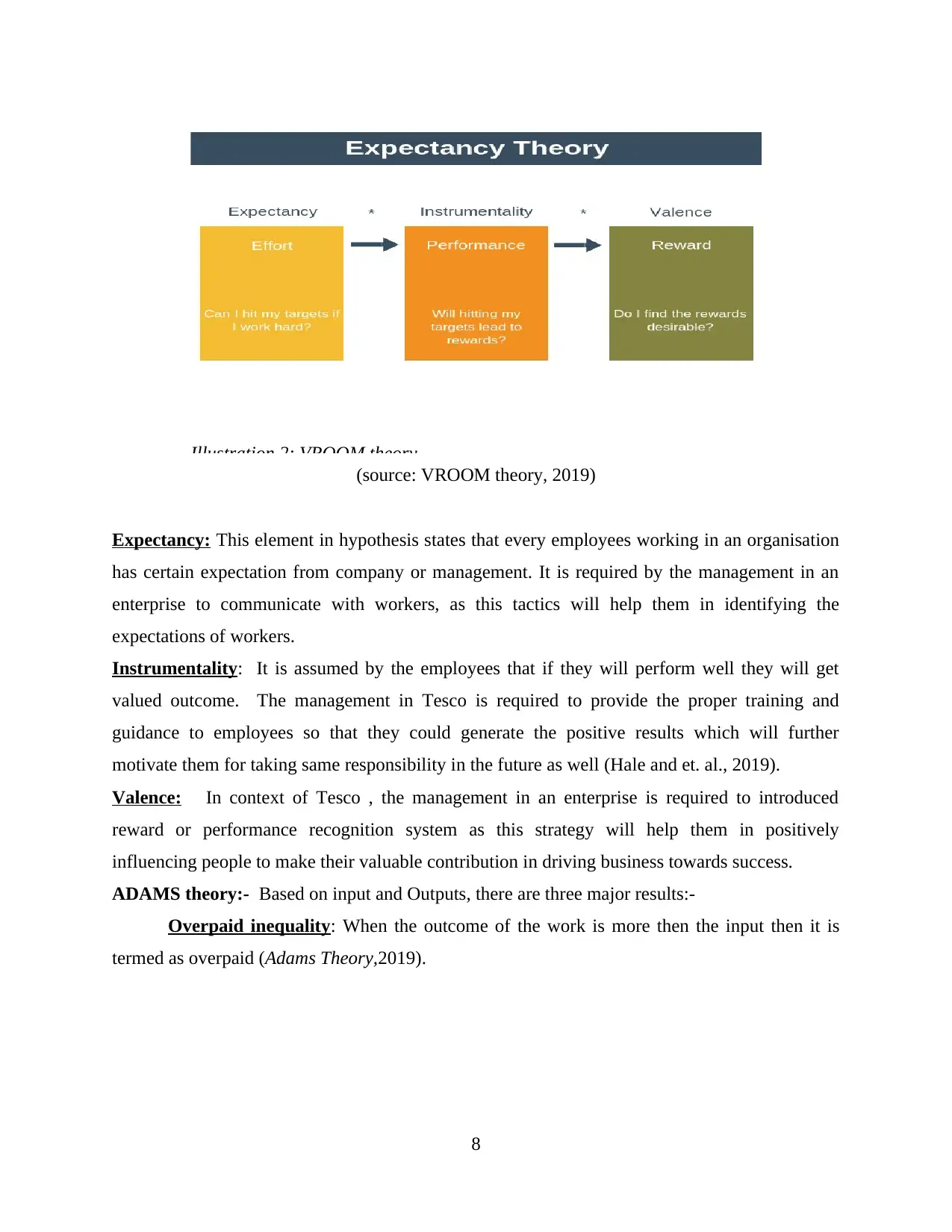
(source: VROOM theory, 2019)
Expectancy: This element in hypothesis states that every employees working in an organisation
has certain expectation from company or management. It is required by the management in an
enterprise to communicate with workers, as this tactics will help them in identifying the
expectations of workers.
Instrumentality: It is assumed by the employees that if they will perform well they will get
valued outcome. The management in Tesco is required to provide the proper training and
guidance to employees so that they could generate the positive results which will further
motivate them for taking same responsibility in the future as well (Hale and et. al., 2019).
Valence: In context of Tesco , the management in an enterprise is required to introduced
reward or performance recognition system as this strategy will help them in positively
influencing people to make their valuable contribution in driving business towards success.
ADAMS theory:- Based on input and Outputs, there are three major results:-
Overpaid inequality: When the outcome of the work is more then the input then it is
termed as overpaid (Adams Theory,2019).
8
Illustration 2: VROOM theory
Expectancy: This element in hypothesis states that every employees working in an organisation
has certain expectation from company or management. It is required by the management in an
enterprise to communicate with workers, as this tactics will help them in identifying the
expectations of workers.
Instrumentality: It is assumed by the employees that if they will perform well they will get
valued outcome. The management in Tesco is required to provide the proper training and
guidance to employees so that they could generate the positive results which will further
motivate them for taking same responsibility in the future as well (Hale and et. al., 2019).
Valence: In context of Tesco , the management in an enterprise is required to introduced
reward or performance recognition system as this strategy will help them in positively
influencing people to make their valuable contribution in driving business towards success.
ADAMS theory:- Based on input and Outputs, there are three major results:-
Overpaid inequality: When the outcome of the work is more then the input then it is
termed as overpaid (Adams Theory,2019).
8
Illustration 2: VROOM theory
Paraphrase This Document
Need a fresh take? Get an instant paraphrase of this document with our AI Paraphraser
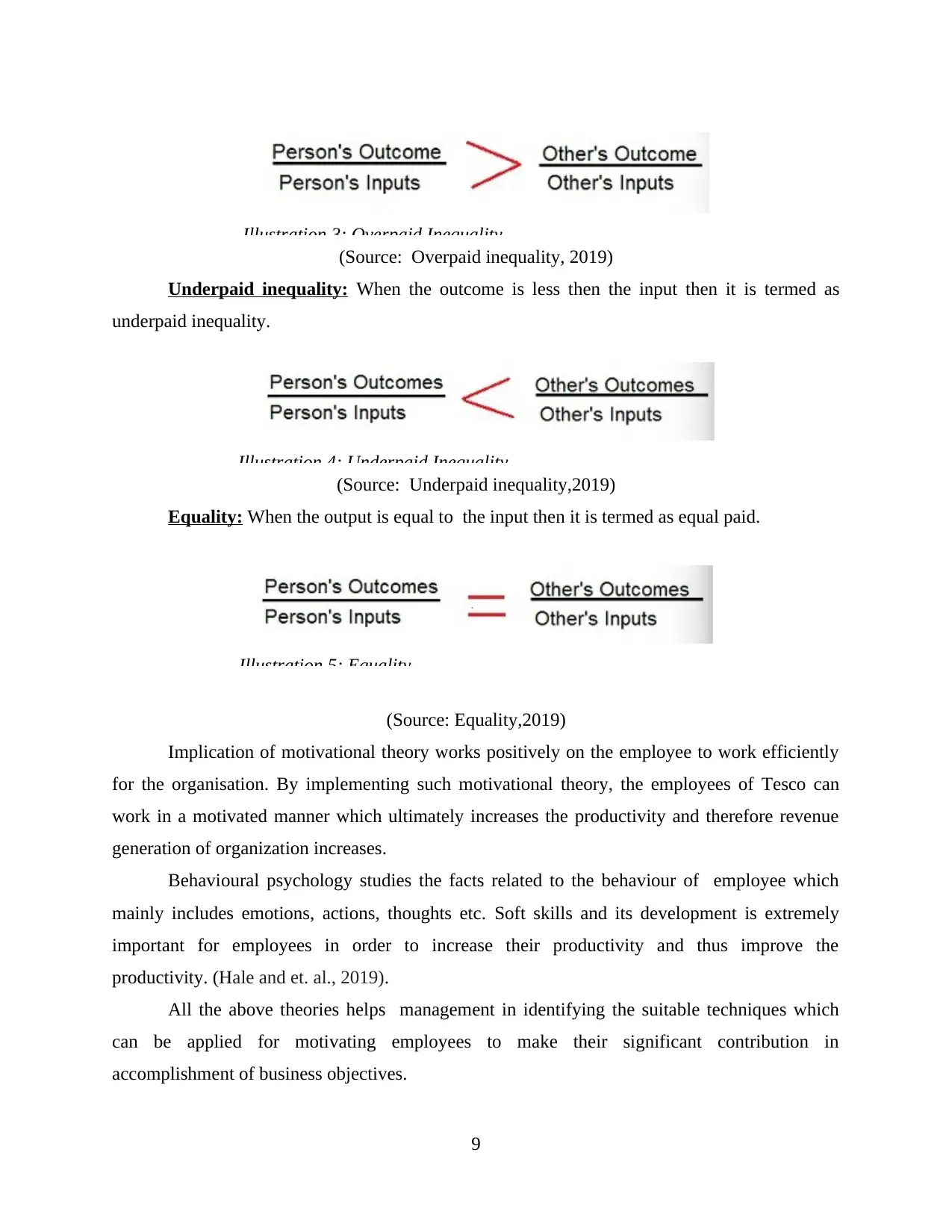
(Source: Overpaid inequality, 2019)
Underpaid inequality: When the outcome is less then the input then it is termed as
underpaid inequality.
(Source: Underpaid inequality,2019)
Equality: When the output is equal to the input then it is termed as equal paid.
(Source: Equality,2019)
Implication of motivational theory works positively on the employee to work efficiently
for the organisation. By implementing such motivational theory, the employees of Tesco can
work in a motivated manner which ultimately increases the productivity and therefore revenue
generation of organization increases.
Behavioural psychology studies the facts related to the behaviour of employee which
mainly includes emotions, actions, thoughts etc. Soft skills and its development is extremely
important for employees in order to increase their productivity and thus improve the
productivity. (Hale and et. al., 2019).
All the above theories helps management in identifying the suitable techniques which
can be applied for motivating employees to make their significant contribution in
accomplishment of business objectives.
9
Illustration 3: Overpaid Inequality
Illustration 4: Underpaid Inequality
Illustration 5: Equality
Underpaid inequality: When the outcome is less then the input then it is termed as
underpaid inequality.
(Source: Underpaid inequality,2019)
Equality: When the output is equal to the input then it is termed as equal paid.
(Source: Equality,2019)
Implication of motivational theory works positively on the employee to work efficiently
for the organisation. By implementing such motivational theory, the employees of Tesco can
work in a motivated manner which ultimately increases the productivity and therefore revenue
generation of organization increases.
Behavioural psychology studies the facts related to the behaviour of employee which
mainly includes emotions, actions, thoughts etc. Soft skills and its development is extremely
important for employees in order to increase their productivity and thus improve the
productivity. (Hale and et. al., 2019).
All the above theories helps management in identifying the suitable techniques which
can be applied for motivating employees to make their significant contribution in
accomplishment of business objectives.
9
Illustration 3: Overpaid Inequality
Illustration 4: Underpaid Inequality
Illustration 5: Equality
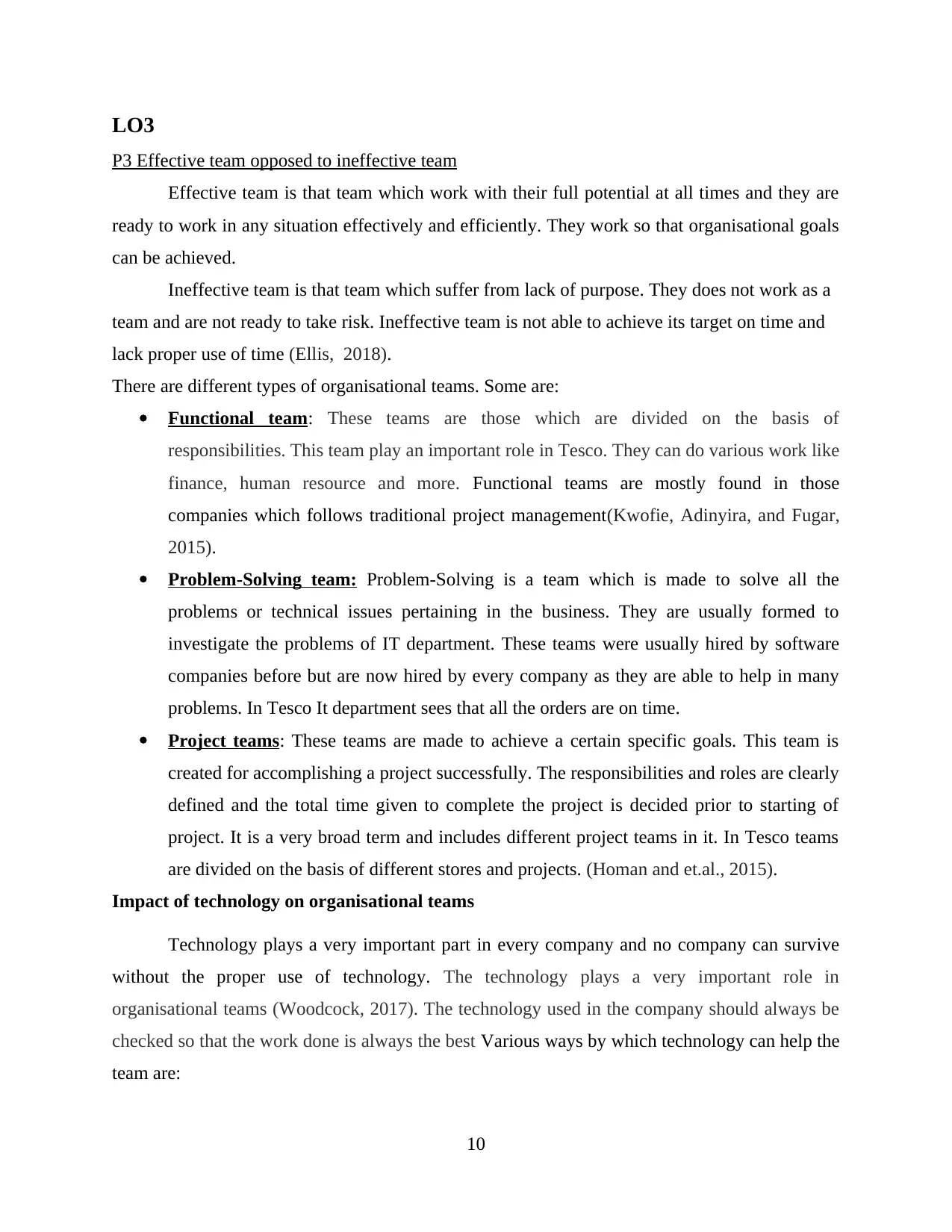
LO3
P3 Effective team opposed to ineffective team
Effective team is that team which work with their full potential at all times and they are
ready to work in any situation effectively and efficiently. They work so that organisational goals
can be achieved.
Ineffective team is that team which suffer from lack of purpose. They does not work as a
team and are not ready to take risk. Ineffective team is not able to achieve its target on time and
lack proper use of time (Ellis, 2018).
There are different types of organisational teams. Some are:
Functional team: These teams are those which are divided on the basis of
responsibilities. This team play an important role in Tesco. They can do various work like
finance, human resource and more. Functional teams are mostly found in those
companies which follows traditional project management(Kwofie, Adinyira, and Fugar,
2015).
Problem-Solving team: Problem-Solving is a team which is made to solve all the
problems or technical issues pertaining in the business. They are usually formed to
investigate the problems of IT department. These teams were usually hired by software
companies before but are now hired by every company as they are able to help in many
problems. In Tesco It department sees that all the orders are on time.
Project teams: These teams are made to achieve a certain specific goals. This team is
created for accomplishing a project successfully. The responsibilities and roles are clearly
defined and the total time given to complete the project is decided prior to starting of
project. It is a very broad term and includes different project teams in it. In Tesco teams
are divided on the basis of different stores and projects. (Homan and et.al., 2015).
Impact of technology on organisational teams
Technology plays a very important part in every company and no company can survive
without the proper use of technology. The technology plays a very important role in
organisational teams (Woodcock, 2017). The technology used in the company should always be
checked so that the work done is always the best Various ways by which technology can help the
team are:
10
P3 Effective team opposed to ineffective team
Effective team is that team which work with their full potential at all times and they are
ready to work in any situation effectively and efficiently. They work so that organisational goals
can be achieved.
Ineffective team is that team which suffer from lack of purpose. They does not work as a
team and are not ready to take risk. Ineffective team is not able to achieve its target on time and
lack proper use of time (Ellis, 2018).
There are different types of organisational teams. Some are:
Functional team: These teams are those which are divided on the basis of
responsibilities. This team play an important role in Tesco. They can do various work like
finance, human resource and more. Functional teams are mostly found in those
companies which follows traditional project management(Kwofie, Adinyira, and Fugar,
2015).
Problem-Solving team: Problem-Solving is a team which is made to solve all the
problems or technical issues pertaining in the business. They are usually formed to
investigate the problems of IT department. These teams were usually hired by software
companies before but are now hired by every company as they are able to help in many
problems. In Tesco It department sees that all the orders are on time.
Project teams: These teams are made to achieve a certain specific goals. This team is
created for accomplishing a project successfully. The responsibilities and roles are clearly
defined and the total time given to complete the project is decided prior to starting of
project. It is a very broad term and includes different project teams in it. In Tesco teams
are divided on the basis of different stores and projects. (Homan and et.al., 2015).
Impact of technology on organisational teams
Technology plays a very important part in every company and no company can survive
without the proper use of technology. The technology plays a very important role in
organisational teams (Woodcock, 2017). The technology used in the company should always be
checked so that the work done is always the best Various ways by which technology can help the
team are:
10
⊘ This is a preview!⊘
Do you want full access?
Subscribe today to unlock all pages.

Trusted by 1+ million students worldwide
1 out of 18
Related Documents
Your All-in-One AI-Powered Toolkit for Academic Success.
+13062052269
info@desklib.com
Available 24*7 on WhatsApp / Email
![[object Object]](/_next/static/media/star-bottom.7253800d.svg)
Unlock your academic potential
Copyright © 2020–2026 A2Z Services. All Rights Reserved. Developed and managed by ZUCOL.





